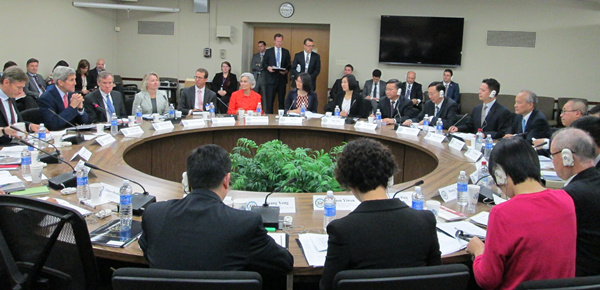 |
|
US Secretary of State John Kerry (second from left sitting in the roundtable) and Chinese Ambassador to the US Cui Tiankai (second from right in roundtable) are among several dozen Chinese and US government officials attending last Thursday's opening ceremony of the 19th round China US Human Rights Dialogue held in Washington on Aug 13-14.[Provided to China Daily] |
China and the United States held their 19th Human Rights Dialogue in Washington last week during which officials from the two sides discussed the human rights situations in both countries and exchanged views in a candid and professional manner.
However, an Associated Press story released on Friday, one day after the dialogue was concluded, said China plays down US human rights concerns, citing a US State Department's top official who pointed to growing US alarm over the human rights situation in China. The official said that the topic would feature at the summit meeting in September between US President Barack Obama and Chinese President Xi Jinping.
Li Junhua, director of the international division of the Chinese Foreign Ministry, who headed the Chinese delegation in last week's dialogue, said China is open to human rights discussions but the issue should not dominate the upcoming Xi-Obama summit.
China wants to cultivate a good, cordial atmosphere for the upcoming meeting between Xi and Obama, as this will help both sides achieve fruitful results. But the entire world knows Beijing and Washington cannot see eye to eye with each other over human rights issues.
Unlike the US which often uses human rights as an excuse to push its own hidden agendas worldwide, China has no intention either to play up or to play down the human rights issue. So far, its approach in handling its differences in human rights with the US and other Western countries has been both practical and far-sighted.
Due to differences in historical and cultural backgrounds as well as in political and social systems, there is a big divide in each side's perceptions on human rights and the ways to realize human rights protection objectives.
China is willing to gradually reduce that discrepancy so that the two sides can put their differences at bay and jointly push for cooperation that can contribute to global efforts to protect human rights.
This explains why China has conducted rounds of dialogues on human rights over the years with various Western countries including the US, the European Union, the United Kingdom, Germany and Australia.
After rounds of dialogues and consultations, the China-US human rights dialogues mechanism has helped the two countries built more consensus and deepened understanding about each other's perceptions and ideals concerning human rights.
It has gradually shifted from focusing on isolated cases to a more balanced and comprehensive agenda. More importantly, the dialogue has involved into a platform through which both can learn from each other's good practices, rather than merely a stage for negotiation and bargaining.
As a country that perceives itself as a human rights champion and a "beacon" of freedom and democracy, the US has been accustomed to preaching to others on human rights. Naturally, there has been growing opposition worldwide to the US's condescending manner and interference into other countries' internal affairs under the pretext of human rights.
What has happened in the US in recent years also indicates it is difficult for the country to present itself as a qualified role model now.
Earlier this month, on the eve of the anniversary of the Ferguson turmoil triggered by the killing of black teenager Michael Brown by a white police officer, a 19-year-old black man was shot dead in Texas by a white officer during a burglary call.
The Human Rights Record of the United States in 2014, released by China's State Council Information Office in June, has criticized the long-standing racial discrimination in the US, citing multiple cases of arbitrary police killing of African-Americans, which has exposed the lie of racial "equality" in the US and the rise of racial hatred.
The only reasonable approach the US can take is to stop pointing its finger at others and start reflecting on its own human rights issues, rather than preaching its double standards.
The author is a senior writer with China Daily [email protected]